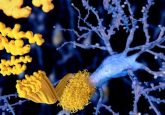Potential benefits of Angiotensin II receptor blockade for the treatment of preclinical, early Alzheimer’s disease

We have recently published [1] evidence demonstrating that candesartan, an Angiotensin II AT1 receptor blocker (ARB), is a promising candidate therapeutic for early Alzheimer’s disease. The present report elaborates on this publication and helps to place the recent results in an appropriate context. Background Alzheimer’s disease is the most frequent age-related dementia, a progressing, devastating illness currently without effective treatment. Although its incidence advances with age, several gene mutations and medical risk factors injuring the brain increase individual vulnerability to the disease several-fold. They include, but are not limited to cardiovascular disease, in particular hypertension, metabolic disorders such as diabetes,...





